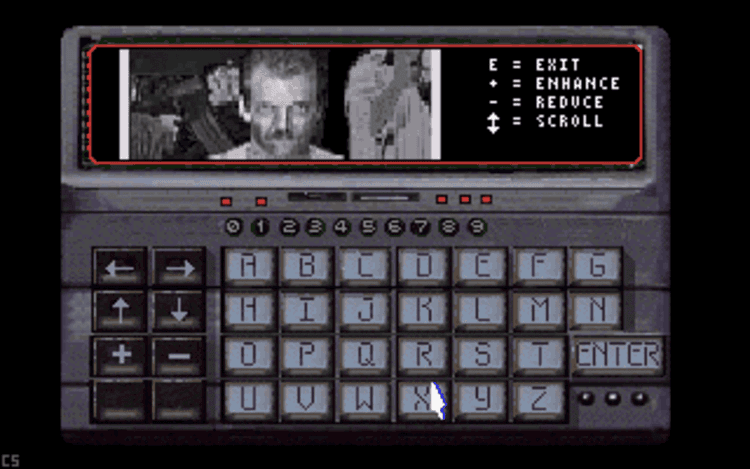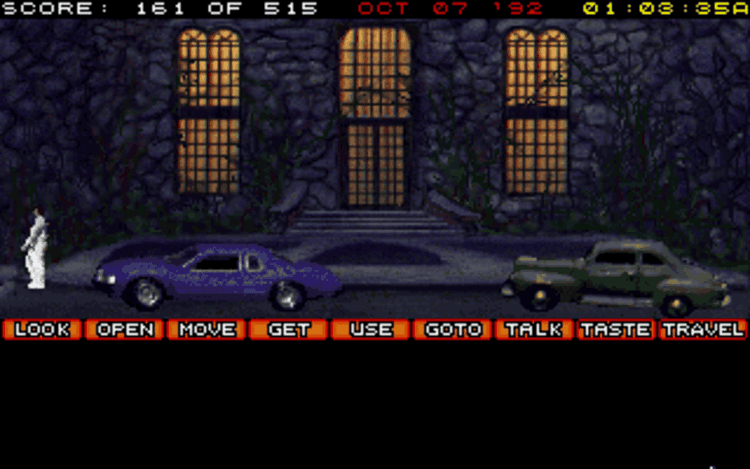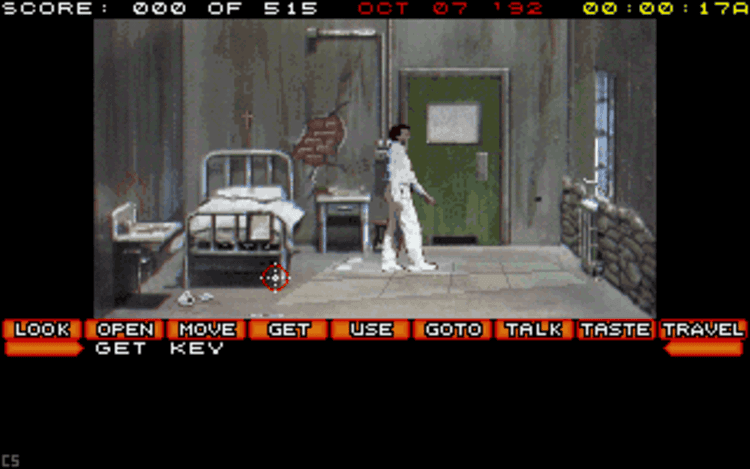
Countdown is a gripping point-and-click adventure from Access Software that puts you in the shoes of Mason Powers, a spy trapped in a web of conspiracy and fading memories. The game blends investigation, dialogue trees, and timed decisions into a tense narrative that rewards keen observation and smart play. Fans of story-driven mysteries like Mean Streets and Gabriel Knight will recognize the focus on interrogation, puzzle-solving, and atmosphere, while Countdown’s relentless clock adds urgency. Whether you want to play a classic game online or revisit a cult favorite, its blend of intrigue and exploration still feels compelling and memorable.
Countdown begins with an image that grabs you by the collar: a secret agent in a foreign asylum, disoriented, accused of murder, and certain that someone wants him silenced. Developed and published by Access Software, the game channels the studio’s flair for cinematic presentation and detective storytelling into a tightly wound espionage tale. You guide Mason Powers through a maze of clues, half-truths, and dangerous encounters, piecing together what happened and why everyone seems to be one step ahead. From the first scene onward, Countdown sells the fantasy of being an operative with just enough training to improvise—and just enough doubt to make every decision feel risky.
What separates Countdown from many contemporaries is how often words are your sharpest tool. Dialogue isn’t simply a list of topics; it’s a set of attitudes that shape how others react. Bluff, pressure, charm, or play it straight—the right tone can open doors that a key never will. Interrogations feed directly into the larger investigation, where each location hides objects, documents, and environmental details that nudge the story forward. Puzzles are rarely abstract; they’re grounded in the setting, encouraging you to search rooms methodically, study props, and infer motives. The result is a game that invites you to think like a field agent, weighing information under pressure and making the most of limited time.
Countdown’s signature mechanic is its ever-present time limit. Hours slip away as you travel, investigate, and follow leads, creating a natural tension that transforms even small actions into meaningful choices. Take the faster route or save resources? Pursue a risky informant or play it safe and potentially miss a breakthrough? The ticking clock never feels like a gimmick; it’s the spine of the experience, pushing you to prioritize, to trust your hunches, and to accept that some opportunities won’t come twice. The structure encourages replay, too—once you learn where the dead ends are, you can chart a cleaner path on your next run and uncover scenes you might have missed.
Access Software leaned into a filmic aesthetic that still gives Countdown its identity. Character portraits look startlingly lifelike, and flashback sequences punctuate the mystery with bursts of memory that reframe what you think you know. The game’s travel system hops between international locations—airports, city streets, safe houses, and seedy hideouts—so the narrative feels big without losing focus. You’ll also encounter top-down segments that play like tense stealth mazes, requiring you to time movements, duck into rooms, and avoid capture. It’s a tonal switch that works: the camera shift underscores just how precarious Mason’s situation really is.
Countdown can be unforgiving—interviews can go sideways, traps can spring, and recklessness is punished. But its fairness lies in feedback. NPCs react to your demeanor in ways you can read and learn from; rooms offer subtle hints when inspected thoroughly; and the story rewards diligence with logical breakthroughs. The hardest moments are rarely about pixel-hunting—they’re about synthesizing what you’ve learned and applying it under time pressure. If you relish adventure games that expect you to take notes, connect dots, and commit to decisions, Countdown hits that sweet spot between cerebral and cinematic.
Beyond its visuals, the game’s audio design adds grit: crackling voices, stingers that underline a reveal, and ambient cues that build tension. The interface embraces classic verb-driven interaction with a clean layout that minimizes friction. You point, you choose an action, and the result is immediate—ideal for players who want to stay immersed in narrative rather than wrestle with commands. Even small touches, like context-sensitive descriptions, help the world feel reactive and grounded.
Mystery adventures tend to live or die by pacing, and Countdown nails the cadence of discovery. The plot unfolds in layers, with each lead teasing another. The timer ensures momentum, nudging you along before you overthink the obvious. Replaying reveals how malleable many scenes are: a softer conversation might yield a name, a harder edge might force a confrontation, and a well-timed detour can shave precious hours from your route. In an era packed with celebrated adventures, Countdown stood out for merging detective play with a genuine sense of urgency—and that blend continues to feel distinct.
For those who want to revisit this classic or try it for the first time, it’s easy to play Countdown online. You can enjoy the full game for free in a browser, with smooth play on both desktop and mobile devices without restrictions. Whether you’re sneaking through corridors, cross-examining suspects, or booking the next flight out, the experience translates naturally to modern screens and controls, making it simple to dive straight into the intrigue.
Countdown remains a memorable spy story because it trusts the player. It asks you to observe, to read people, and to decide under pressure. Its world feels lived-in, its puzzles grow from the fiction, and its clock keeps every scene tight. To control the game, you primarily use a mouse for point-and-click exploration and verb selection, while certain top-down moments respond well to directional movement for precise navigation. If you approach each scene with curiosity and a plan, the countdown becomes less a threat and more an invitation to think like a professional.
All used codes are publicly available and the game belongs to its original authors.
Share game
Share game








Share game